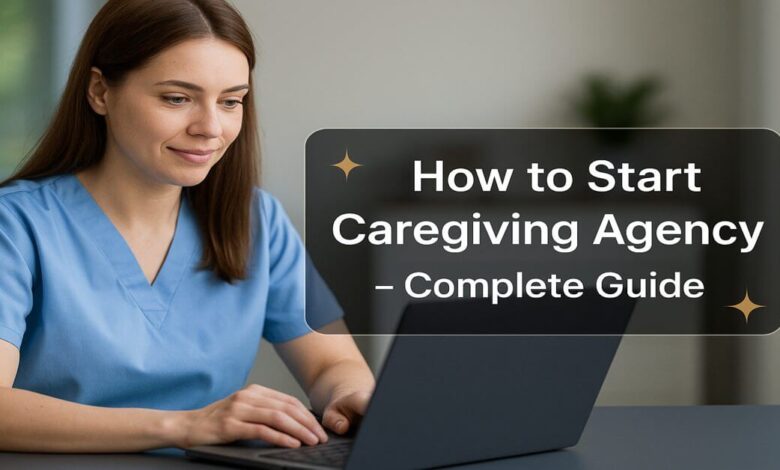
How to Start Caregiving Agency – Complete Guide
The private caregiver industry is one of the fastest-growing sectors in the U.S. healthcare system. Fueled by the aging Baby Boomer population over 76 million strong and representing nearly 25% of the U.S. population there is an unprecedented demand for in-home care services.
As life expectancy increases and seniors seek to maintain independence in their own homes, the demand for personalized, non-medical caregiving services continues to rise.
If you have a passion for helping others and an entrepreneurial spirit, now is the ideal time to start your own private caregiver agency. This guide outlines the key factors driving industry growth, the services agencies provide, and the practical steps to launching and scaling your caregiving business.
Why the Demand Is Growing?
The aging U.S. population is driving explosive growth in the home care industry:
- 12 million Americans currently require some form of home health care
- Home health care revenue has grown to over $93 billion
- 90% of seniors plan to remain in their homes as they age
- Over 10,000 Baby Boomers turn 65 every day
- By 2030, over 61 million Americans will be aged 66 to 84
This demand presents a unique opportunity for aspiring entrepreneurs to establish a mission-driven business that provides essential care and companionship to seniors and other individuals with care needs.
What Services Do Private Caregiver Agencies Offer?
Private caregiver agencies deliver non-medical and personal care services customized to each client’s needs. These services can be provided on a part-time or full-time basis, up to 24 hours a day. Common services include:
Personal Care:
- Bathing, grooming, dressing, toileting
- Assistance with mobility and transfers
- Medication reminders
- Feeding and meal assistance
Household Support:
- Light housekeeping (dusting, vacuuming, taking out trash)
- Laundry and bed-making
- Grocery shopping and meal preparation
- Mail pickup and errands
Companionship and Engagement:
- Social interaction, games, and cognitive stimulation
- Escort to doctor’s appointments, social events, or religious services
These services help seniors maintain independence, reduce social isolation, and improve quality of life while remaining in their homes.
Check Also: Caregiver Affidavit California – Complete Guide
Private Caregiver Agencies vs. Independent Caregivers:
Agency Caregivers:
- Screened, trained, licensed, and insured
- Criminal background checks and drug testing performed
- Covered under workers’ compensation and liability insurance
- Clients are protected from legal and financial risk
- Agencies manage scheduling, training, and compliance
Independent Caregivers:
- Hired directly by families or clients
- Often less expensive but lack oversight or insurance
- Families assume the risk of injuries, tax liabilities, and legal obligations
- Can be stressful to manage without professional support
Choosing a licensed caregiver agency offers greater reliability, accountability, and legal protection for both clients and their families.
How to Start Caregiving Agency?
1. Create a Legal Business Entity
Choose a structure such as a Sole Proprietorship, LLC, or Corporation. Each has its own tax implications, liability protections, and administrative requirements. Consult with a business attorney or accountant to decide the best fit.
2. Obtain an Employer Identification Number (EIN)
Apply for your EIN through the IRS website. This number is required for tax reporting, hiring employees, and opening business bank accounts.
3. Register Your Business
Visit your Secretary of State’s website to register your agency and check for name availability. Secure a domain name and create professional branding materials including a website, business cards, and brochures.
4. Set Up Financial Systems
Start-up costs typically range from $50,000 to $75,000. This includes licensing fees, marketing, payroll, insurance, and operational expenses. Secure funding through personal savings, loans, or grants. Implement a reliable accounting system for billing and payroll.
5. Establish an Office
Choose a location that is affordable and accessible. You may not need a high-traffic retail space—many home care businesses operate from modest offices in suburban or residential areas. If you are offering non-medical services, equipment costs are minimal. Medical agencies will require additional licensing and equipment.
6. Develop Policies and Procedures
Create or purchase a detailed Policy & Procedures Manual covering:
- Client intake and assessment
- Care plans and documentation
- Employee onboarding and training
- Scheduling, time tracking, and billing
- Health and safety protocols
- Data privacy and compliance with HIPAA (if applicable)
7. Hire and Train Your Caregivers
Recruit qualified professionals such as:
- Certified Nursing Assistants (CNAs)
- Home Health Aides (HHAs)
- Personal Care Assistants (PCAs)
Verify their credentials, conduct background checks, and ensure they are bonded and insured. Ongoing training and professional development help retain high-quality staff and improve client satisfaction.
8. Build a Caregiver Retention Program
Retention strategies include:
- Competitive pay and flexible hours
- Recognition programs and performance incentives
- Continuous training and career advancement
- Supportive workplace culture
Understanding caregiver motivations and building trust is key to reducing turnover.
9. Market Your Business
Develop a multi-channel marketing strategy using:
- Local advertising (flyers, newspapers, community bulletins)
- Online platforms (Google Business Profile, website, blogs)
- Social media (Facebook, Instagram, LinkedIn)
- Partnerships with local doctors, rehab centers, and senior organizations
Your brand should communicate compassion, professionalism, and trust.
Franchising as an Alternative:
If you prefer a turnkey solution, consider opening a caregiver franchise. Franchise opportunities offer:
- Proven business models
- Brand recognition
- Ongoing training and support
- Marketing materials and operational guidance
One example is RIGHT ACCORD Senior Care Franchise, which provides detailed start-up assistance, systems, and nationwide brand visibility.
To learn more about RIGHT ACCORD franchising, visit their website or call 1.877.754.5847.
Final Thoughts:
Starting a private caregiver agency is both a meaningful mission and a sound business opportunity. With the right planning, licensing, and dedication, you can provide essential services that enable seniors to age with dignity and independence.
Now is the time to make a difference in your community and take advantage of a rapidly expanding industry. Whether you choose to build your agency independently or through a franchise, the demand is strong—and growing. Invest with purpose, serve with compassion, and build a legacy through caregiving.
Frequently Asked Questions:
How do I find clients for my caregiving agency?
Partner with local hospitals, clinics, and social workers
Use digital marketing (Google, Facebook, care directories)
Build a referral network with GPs or senior care coordinators
Register with local authorities for homecare contracts (especially in the UK)How long does it take to become fully operational?
It can take 2–6 months, depending on licensing approvals, recruitment, and setup.
What is a caregiving agency?
A caregiving agency provides non-medical or medical care services to individuals, often seniors, people with disabilities, or those recovering from illness, in their homes or care facilities.




